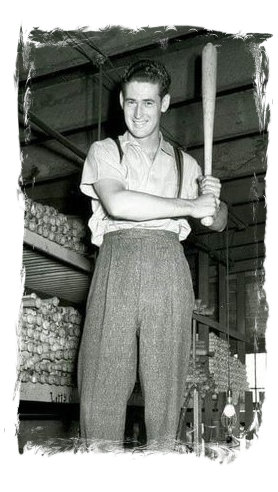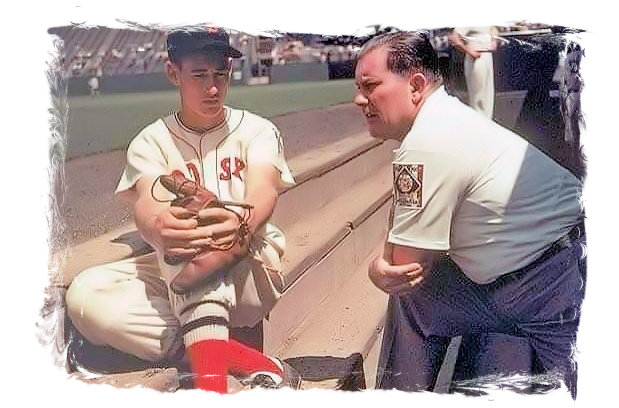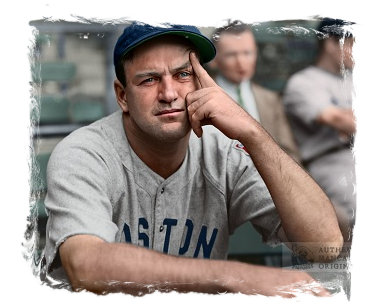In the six years of Tom Yawkey's ownership of the Red Sox the team had failed, after spending $350K, his attempts to buy a pennant had not worked. And after six years as a major league manager, Joe Cronin was still the youngest skipper in baseball and the only remaining player-manager in the American League. Yawkey, Eddie Collins and Cronin remained active in the off-season, now concentrating on trading players rather than buying them. One decision was inevitable. The impending arrival of Ted Williams made rightfielder Ben Chapman, with his abrasive, racist and anti-semetic personality and even with his .340 batting average, third best in the league, expendable. Williams had won the Triple Crown in the American Association in 1938. For the Minneapolis Millers, he batted .366 with 43 home runs and 143 RBIs. He also led the league with 130 runs scored and 370 total bases. Lefty Grove had rested over the winter, returning home to hunt and fish. The doctors had told him that he had to stop using nicotine because it hinders the blood circulation. So Lefty gave up his daily regimen of seven cigars and a can of chewing tobacco. But the team's big concern was about Grove's pitching arm and it caused the Red Sox to go out and seek more pitching. So on December 15th, Chapman was traded to the Cleveland Indians in exchange for pitcher Denny Galehouse and shortstp Tommy Irwin. It was the first of Galehouse’s two stints as a member of the Red Sox. The club made another deal, trading pitcher Archie McKain and thirdbaseman Mike Higgins, who had batted .303 in 1938, to Detroit for veteran pitcher Elden Auker, outfielder Chet Morgan and pitcher Jake Wade. Cronin thought Higgins was dispensable because he liked the way rookie Jim Tabor had developed and wanted him as his thirdbaseman. Cronin claimed that he had not been that impressed with Tabor the previous spring, but said he couldn’t believe how much the rookie had improved. He favorably compared Tabor’s defense to that of his old Pittsburgh teammate Pie Traynor. So the Red Sox dumped two of their more productive offense of players, for a couple of mediocre pitchers as it turned out. Even though Tabor and Williams more than adequately replaced Chapman and Higgins, the Red Sox would have fared better, if they had received equal value for the trades. But Tabor was impressive in spring training. The confidence he gained from knowing the third-base job was was noticeable. He was described as “cock-sure” and “like a panther" as a fielder. As it turned out Jimmie Foxx was an avid dancer and that was how he kept his legs in shape in the off-season.
Ted Williams was late to get the spring training because he got sick while driving from San Diego and had to be hospitalized in New Orleans for a few days. After he arrived, Cronin sat him down and lectured him that this was no place for his clowning and playing in the major league's was serious business. He also assured him that no matter how he played during spring training, he would be the Red Sox starting rightfielder. No one had to tell Ted how great he was, but on one occasion Doc Cramer took exception to the rookie’s cockiness and threw a punch at him in a vain attempt to inject him with humility. Ted didn't disappoint anyone in spring training. He got off to a good start, hitting a triple and a single in each of the first two intrasquad games. His confidence was high, not having seen anything from the big-league pitchers that he was intimidated by. On March 9th he hit two balls all the way to the deep right field fence, some 500 ft away. In the first intrasquad game on March 10th, Jim Tabor had four hits, including two doubles. Ted also had two hits, including a towering bomb to right field that went 400 ft for a triple. On March 27th, pitcher Monte Weaver was purchased from Washington for cash. But Lefty Grove declared himself fit and ready to pitch. On March 29th he threw three innings, giving up just one hit. In an exhibition game in Atlanta on April 1st, Ted smacked a bases-loaded triple, but in the outfield let a ball rolled between his legs. Later, after striking out and throwing his bat in disgust, he took off after a towering pop up down the right-field line and pulled up short when he heard the crowd yelling at him. As the fans laughed, Williams picked up the baseball and threw it over the roof. That cost him a $50 fine from Cronin. The next day he hit a monster home run out of the ballpark. It seemed whenever he got himself in trouble, his bat would get him out of it. Ted was drawn to catcher Moe Berg in the spring. He peppered him with questions about the pitchers in the league and what they would throw in certain situations. Berg, in turn, became very fond of Williams and looked upon him amusingly. The press flocked to Ted because he had an opinion on everything and wasn't shy about telling everyone what his feelings were. His picture was splashed across the Boston newspapers almost on a daily basis. On April 5th, Lefty Grove started again and pitched four strong innings. Cronin decided it would be wise to pitch him just once a week. Lefty became known as the "Sunday Pitcher". When spring training broke, Cronin said that he was concerned about the team's pitching, but had high praise for Ted Williams and Jim Tabor.
On opening day in New York on April 20th, Ted Williams played right-field and hit sixth, between Jim Tabor and Bobby Doerr. He was admittedly nervous and Red Ruffing struck him out in his first plate appearance, but in his second at-bat he doubled off the right-field wall for his first major league hit. But he was only one of three Red Sox to reach second base. Lefty Grove, pitching for the first time in a regular season game since last summer, allowed seven hits and only one earned run in a strong eight innings, but lost 2 to 0. For the Yankees. Lou Gehrig looked tired and sloppy in the field. The buildup for Ted Williams had been tremendous. He received a larger ovation than any of the established players when he was introduced on April 21st at the Fenway Park opener. The fans shouted his name every time he came to the plate. He made a great catch in the field and the fans in right field greeted him like a hero. He got his first hit at Fenway off southpaw Ed Smith. It was an RBI single in the sixth inning, his only hit in five times up. It was Doc Cramer's bases loaded double that broke open a 2-2 tie ball game. Behind the five-hit pitching of Jim Bagby, the Red Sox won 9 to 2. Cramer and Williams each doubled in runs in the next game and the Sox beat the A's again, 5 to 2. Sox starter, Woody Rich threw a complete game six-hitter. In their third match-up against the A's on April 23rd, Ted scorched a line drive into the right-center field bleachers just to the right of the outfield triangle, about 430 feet away for his first home run. In his next time up he hit a long fly ball off the wall in left-center that missed being another home run by inches. He was a perfect four for four when he came up in his final at-bat in the bottom of the ninth-inning, but the best he could do was a fly ball to left-field. The Red Sox lost 12 to 8, but Ted had gone seven 7 for 14 in the three-game series. Jim Tabor went 4-for-5 on April 24th against Washington and Jimmie Foxx fired out his first home run of the season. But the headline read that Ted Williams failed five times to get a hit with runners on base. After banging a double off the wall in his first time up, Ted went hitless thereafter and the Sox lost 10-9. On the April 25th, Jim Tabor's ninth inning single scored Foxx to tie the Tigers in Detroit. Then Foxx homered in the 11th inning to break the 5-5 tie. He sent the ball high over the left field wall where it landed on a Lansdowne Street rooftop and bounced onto the railroad tracks some 440 ft away, for the walk-off 6 to 5 win. Fritz Ostermueller had allowed just five hits in six innings. On April 26th, Joe Cronin decided that he didn't need both Leo Nonnenkamp and Fabian Gaffke as back-ups for Ted Williams. Gaffke was therefore sent down to Louisville. Lefty Grove started again in Philadelphia on April 29th and made it into the sixth inning, having given up a pair of runs on three hits leaving with a 2-1 lead. The A's tied things up and the Sox won the game in the ninth inning on a single by Johnny Peacock that scored Bobby Doerr, 3 to 2. Jimmie Foxx was robbed of a home run when he hit the ball out of the park, some 425 ft away and it landed in a screened off area that surrounded the newly erected light tower. It was ruled a ground-rule double. The rule was changed the very next day. The Sox finished April with a 3-1 win in Philly on April 30th, and were tied for the top spot in the American League. Jim Bagby was the winning pitcher and banged out his first major league homer to win it. Bobby Doerr also chalked up his first home run of the year.
The Red Sox were rained out on May 2nd in Cleveland, but the day took on more significance because Lou Gehrig's consecutive game streak was halted at 2130 games in Detroit. Gehrig had been hampered by weakness over the previous two seasons and was later diagnosed with Amyotrophic Lateral Sclerosis (ALS) or "Lou Gehrig's Disease". Joe Vosmik and Jimmie Foxx had seven of the Red Sox 14 hits in a 5 to 1 win over the Indians in Cleveland on May 3rd. It gave Elden Auker his first Sox win, 5 to 1. Auker allowed just five hits. On May 4th in Detroit, Ted Williams laced a ball over the right-field roof of Briggs Stadium, but just foul by inches. No player had ever hit the ball over the roof before. In the fourth inning, with Joe Cronin on first and behind 4-0, Ted launched a towering smash that landed on the right field roof and bounced back onto the playing field. It had landed 360 ft away and 120 feet above the field. It was the longest homer ever hit in the ballpark. Then in the fifth inning, with one out and with Foxx and Cronin on base, Ted dug in against Bob Harris. Harris' first three pitches were balls. The next pitch came and Ted hit a rising line drive in a heartbeat. This one flew over the roof and landed across adjoining Trumbull Avenue. It was said that firstbaseman, slugger Hank Greenberg looked at him with awe as he passed him at first base and then sent him a note asking him to come out to batting practice and show him where he gets his power. The Sox won 7 to 4 and Ted had driven in five runs. The next day, rookie pitcher Woody Rich threw a three hitter and along with Cronin and Foxx, propelled the Sox into first place with a 4-1 decision over the Tigers. The Boston Bees were also in first place and it was the first time since 1918 that both teams occupied the top spot in their leagues at the same time. Lefty Grove chalked up his first win of the season in the next game, 5 to 4. It was his first win since July of last year. Joe Vosmik was 3-for-4 with a home run. Unfortunately, Doc Cramer began the season feebly, swatting away at virtually everything without success, and until mid-May his batting average hovered below .200. Exhibiting his frustration, he attempted to attain superhuman feats in the field, throwing himself into the center-field screen in a vain attempt to snare a Hank Greenberg drive in Detroit, and then days later performing a somersault in catching a “fierce liner” off the bat of Rudy York. On May 8th, the Sox purchased outfielder Lou Finney from the Philadelphia A's for $10,000. Detroit and Boston had both claimed Finney on waivers; Mack dealt him to the Red Sox, who paid $2,500 more than the $7,500 waiver price. He was the fifth player on the Sox roster that had come from the A's along with Grove, Foxx, Cramer and Wilson.
Ted Williams emerged from a mini slump on May 9th by smashing out a three run homer in the 10th inning of a slugfest in St. Louis. The victory enabled the Red Sox to hold on to first place. Jimmie Foxx conributed a three-run 450 foot homer to give the Sox a 7-3 lead. But back came the Browns and tied the game at 7-all on a pair of two-run homers. Joe Vosmik opened the 10th with a base hit and moved to third on Foxx's base hit. After Cronin fanned up came Ted. The count went to three and two when Ted shot a line drive over the right field roof, 10 to 8. The Sox scored three runs in the 12th inning thanks to Bobby Doerr's double, to give Lefty Grove a 5 to 4 win in Washington on May 14th. In the game, Doc Cramer went 3-for-7 at the plate, raising his average to .213, thereafter becoming the Cramer of old, with multi-hit games following swiftly after the breakthrough. By the end of the month, he had raised his average close to .300, but by then Cronin had taken him out of his customary leadoff spot, supplanting him with Doerr. Joe Vosmik knocked out two singles, a double and a triple the next game, on May 15th, leading the Sox to a 9-2 decision against the Nats. The Sox then returned to Fenway after a highly successful 9-2 road trip, sitting in second place, 1 1/2 games behind the Yankees. On May 16th, Jim Tabor and Joe Vosmik both went 3-for-5 with five RBIs, as the Red Sox felled the visiting White Sox 18 to 4. Rookie Woody Rich (3-1) gave up six hits and only one earned run. Bobby Doerr was 3-for-3 with a double, as the Sox beat Chicago the next day. The Red Sox next beat up the St. Louis Browns at Fenway on May 19th. Tabor went 4-for-5, with two singles, a double and a home run, in a 15-7 triumph. Ted Williams and Doc Cramer each posted three hits. It was "Ladies Day" and four Tufts students tried to get into the ballpark dressed as women. On May 21st, having won five straight, Lefty Grove scattered nine Detroit hits in an 8-3 win, pitching a complete game. He also knocked a home run into the left field screen in the seventh inning much to the delight of the 24,000 fans. 55 of the Sox 140 runs scored thus far, were driven in by either Ted Williams, Bobby Doerr or Jim Tabor. The three had a combined batting average of .312 Six home runs swept the Red Sox to twin victories over the Washington Nationals pn May 27th. It was the Sox sixth triumph over the Nats in seven games. Lefty Grove, aided by Jimmie Foxx's sixth homer in the first inning, along with one by Joe Vosmik in the eighth inning, with two men on, won the first game, 11 to 4. In the second game with the game tied at 6-6, Vosmik, the first batter up in the ninth inning, blasted a walk-off shot into the left-centerfield screen to give the Sox a 7 to 6 decision. In the final game of the series the Sox bombed Washington 12-7. Foxx accounted for a third of the runs with a single and a triple, while Williams and Cronin each came up with their second home run in as many days. Ted's homer went into the ramp entrance up in the right-centerfield bleachers. The first place Yankees came to town to finish the month and took two of the three games played. In a Memorial Day doubleheader, on May 30th, the Sox were able to win the first game. Ted was chiefly responsible by belting a three run homer 75 ft into the right field bleachers over the 402 ft sign. It was the longest homer ever hit at Fenway Park. Cronin followed with a homer into the left field screen putting the Sox up 4-0. Foxx, not to be outdone, banged one into the screen in left centerfield with two men on. Yankee pitcher Red Ruffing, blew kisses to the Sox fans who booed him, when he got taken out of the game in the fourth inning. Ted provided the Red Sox fans with a huge amount of entertainment. No rookie ever enjoyed himself more. After a big hit, he would pull off his cap and wave it wildly to the fans, with a huge grin plastered on his face. Ted also homered in the second game, but the Sox got walloped 17-9. Through the end of May the Red Sox had a fine 21-12 record, but were already 6 1/2 games behind the red-hot New York Yankees.
On June 1st, the Sox were in Detroit, winning 14 to 5. They popped off 18 hits good for 31 total bases, because of eight doubles, a triple and a home run. Jim Tabor hit three double and Joe Cronin hit two doubles. Bobby Doerr contributed the triple and homer, along with one of the doubles. On June 2nd, Doc Cramer was 5-for-5 in a losing effort against the Tigers. But it was Cronin's two homers that grabbed the headlines in the 8-5 loss. Bob Feller beat the Sox 10-2 in the first game of a doubleheader in Cleveland on June 4th. But Lefty Grove (7-1) brought the Sox back with a 7 to 1 victory, allowing seven hits. In St. Louis the Sox blew a 5-0 lead but came back to win 8 to 7 on June 8th. A pair of singles, and double and a Jimmie Foxx homer brought in four runs, but the Sox found themselves losing 7-5 after seven innings. Lou Finney's eighth inning homer tied things up and then in the ninth, Tom Carey doubled, was bunted over to third and scored the winning run on Joe Vosmik's sac fly. The Sox next made a twin killing in a doubleheader the following day. Fritz Ostermueller pitched eight frames of scoreless ball, winning 4 to 3. His base hit with Joe Cronin on second, produced the winning run in the eighth. The second game was a 18 to 7 laugher. Foxx blasted two home runs, as part of the 27 hits the Red Sox produced in the two games. Ted also homered, his landing on the roof of the right field pavilion. Another doubleheader split happened in Chicago on June 11th. They lost the opener in a see-saw battle, 7-5, but won the nite cap 4 to 3. Jim Tabor blasted two triples in the second game. He scored the Sox first run after his first triple and a ground out. His second three-bagger scored Cronin and put the Sox ahead.
Former Red Sox players Cy Young, Babe Ruth and Tris Speaker, along with GM Eddie Collins were honored as the inaugural members of the Hall of Fame at Cooperstown, where the 100th anniversary of the invention of baseball was celebrated on June 12th. The Baseball Museum and Hall of Fame was dedicated followed by a pick-up game that showcased American League and National League stars to dedicate Doubleday Field. Lefty Grove pitched to Moe Berg for the first two innings for the Honus Wagner team. Babe Ruth appeared as a pinch hitter and popped up. Returning home, the Sox were swept for games by the Tigers and fell to 11 1/2 games behind the Yankees. The Indians came to Fenway next a were swept in a doubleheader on June 18th. The first game was 5 to 4. Lou Finney hit a pinch-hit double that scored Johnny Peacock in the bottom of the eighth inning that won the game. The Sox also came from behind in the second game when Ted Williams hit a three-run bases-loaded double to win the game 5 to 3. On June 20th, Joe Vosmik was the big noise, going 4-for-4 with two triples and three RBIs in am 8 to 1 beating of thge Browns at Fenway. One of the highlights of the season for Lefty Grove came on June 26th. He shut out Washington, 3-0 and Ted Williams went four-for-four, with a double and a triple. Elden Auker shut out the Nats again the next day, 8-0. Lou Finney, who played in place of the ailing Jimmie Foxx, doubled twice and singled, driving in three runs.
The Yankees next came to Fenway to play the second place Red Sox, leading them by 13 1/2 games. On July 1st Jim Tabor went 2-for-3 with a run scored and two stolen bases. He had a “mad plunge for a run in the third” and spiked Yankee catcher Buddy Rosar, who was blocking the plate. Rosar had to leave the game and was admitted to a hospital. Bobby Doerr was 3-for-4 and drove in two runs. On July 2nd, Lefty Grove won the first game of a doubleheader, 7-3, but the Yanks rallied in the late game, winning 9-3. Gene Desautels showed some of his grit. In the first inning of the opening clash, Tommy Henrich collided at home plate and knocked Gene cold – but he held onto the ball and Henrich was out. Henrich later crashed into the wall in right-center, trying to grab Ted Williams' homer, which broke open a 3-3 tie in the seventh inning. He had to leave the game and was taken to the hospital with a concussion. The Sox and Yankees split the day. Joe Cronin brought home two runs in each game, including a two-run homer in the first game.
The Sox then went to Philadelphia where they would have a winning streak of 12 straight games. Jim Tabor had the game of his life on July 4th in Shibe Park. The Red Sox swept the A’s in the holiday twin bill by scores of 17-7 and 18-12, scoring 35 runs on 35 hits. Tabor was just getting warm in the opening game when he went 3-for-5 with a home run, a double, and two RBIs. In the nightcap, Tabor hit two more home runs and had a record-tying performance. He came up with the bases loaded in the third facing A’s starter George Caster. He had hit a grand slam in Philadelphia the previous August and enjoyed Shibe Park one more time with another long ball. In the sixth, the bases were full again for Tabor and he hit an inside-the-park grand slam off Lynn Nelson. He touched Nelson again for a solo shot in the eighth to top off his nine-RBI game. Tabor was only the second major-league player to hit two grand slams in a single game. The four home runs in a doubleheader also tied a record. The next day, Tabor hit another home run against A’s pitching for his fifth home run in three games. Lou Finney had two hits in each of the three games in Philly. Meanwhile, Ted Williams had hit .500 over the last nine games. Against the Yankees in New York on July 7th, with the game tied in the sixth inning, the bases loaded and one out, Emerson Dickman came in and struck out Babe Dahlgren and Red Ruffing. The Sox scored an unearned run in the eighth and beat the Yankees 4-3. The Sox beat the Yankees twice the next day. On July 8th, Fritz Ostermueller allowed them just four hits in the first game, winning 3 to 1. Denny Galehouse then gave up just five hits in the second game, winning that one, 3 to 2. Foxx's ninth inning home run gave the Sox the lead in the second game. Another doubleheader sweep was staged by the Sox the next day. The Red Sox came from behind in both games. Down 3-2, Joe Cronin's two-run homer in the top of the eight, with Ted Williams on, won the opener, 4 to 3. Then Jimmie Foxx's 14th homer in the eighth inning of the second game with Doc Cramer on base, gave the Sox a 5 to 3 victory. The five-game sweep of the Yanks brought the Bosox within striking distance of the New Yorkers ending up 6 1/2 games behind, but that was their last gasp. The All Star game in 1939 was played at Yankee Stadium on July 11th. Doc Cramer was the rightfielder and Joe Cronin was the shortstop for the American League, who won the game 3 to 1 on an unearned run and Joe DiMaggio's home run. Both Cramer and Cronin got a single in four times up. Jimmie Foxx and Lefty Grove both were on the team, but neither played. Ted Williams was not selected for the All-Star game, the only time in his career that it would happen.
An Old Timer's Game was played at Fenway Park on July 12th. The National League old-timers beat the American League old-timers, 8 to 4. The 1912 outfield of Harry Hooper, Tris Speaker and Duffy Lewis played the outfield for the American Leaguers. George Kelly had three hits including a double and Speaker had two hits. Joe Wood was the hitting star with a homer over the left field wall. On July 13th, the Red Sox and Indians played the first night game in major league history in Cleveland. The game went 10 innings and the Sox won it, 4 to 3. at 12:45 AM. The Sox were only 5 1/2 games behind the Yankees at that point, but that was the closest they would get for the rest of the season. Ted Williams' eighth inning homer broke a 5-5 tie in a game the Sox eventually won against the Indians, 9 to 5, on July 15th. After the Tribe knocked Fritz Ostermueller out of the box in the fifth, Emerson Dickman held them scoreless the rest of the way. The Sox completed their 12 game winning streak by taking two from the Tigers on July 16th in Detroit. Lefty Grove won his ninth game with a six-hitter, 9 to 2, in the first game. Gene Desautels had three RBIs and Jimmie Foxx banged out his 15th homer, but the Tigers committed eight errors in the game. Denny Galehouse shut out the Tigers on four hits, 3-0, in the second game. On July 17th, Ted Williams walked over to ex-Red Sox pitcher Bobo Newsom and told him that he was going to hit him hard. His first time up he hit a home run and the second time up touched Newsome for a double. But the Tigers snapped the Sox win streak, 13-6. The Red Sox purchased the Louisville Colonels baseball club of the American Association and cut ties with the Minneapolis Millers in 1939. Pee Wee Reese was an 18-year-old phenom for Louisville, and since Joe Cronin was getting older, it was thought Reese would become the heir apparent. But at one point Reese had only two hits in 24 at-bats. Cronin overreacted and thought that Reese was too small and insisted that the Red Sox move on from him. So Tom Yawkey backed his manager and Pee Wee Reese was traded to the Brooklyn Dodgers for Red Evans and Art Parks and $35,000. Ted Williams was the star in a doubleheader split in Chicago on July 18th. He had six hits and four RBIs and his 77 RBIs led the American League. The Red Sox lost four of the five games played with the White Sox, but then they started on a six game winning streak that brought them back to within seven games of first place. In St. Louis on July 21st, he Sox fought back from a 4-0 deficit to tie the game in the ninth inning, when Jimmie Foxx tripled and was brought home by Ted's base hit. They then won it in the 11th inning on Ted's fourth straight single, this one with the bases loaded. Bobby Doerr had seven hits in a doubleheader sweep of the Browns on July 23rd, 13-5 and 11-3. The Sox hitters collected 24 runs on 31 hits. Doerr, Foxx and Williams each homered. Doerr had four hits in the first game and Ted led the day with five RBIs overall.
Back at Fenway, the Red Sox and White Sox split a doubleheader on July 26th. In the second game, which the BoSox won 6 to 5, the Red Sox overcame a 4-0 deficit. Jimmie Foxx blasted two homers, that accounted for five of the runs. In a loss to the White Sox the next day, Ted Williams went 2-for-3 with a triple while Foxx slugged another homer. Foxx drove in four runs in St. Louis after the Sox had lost the first two games of the series. On July 30th, Jimmie hit his 25th homer, a double and a single in a 6 to 4 win. The Yankees held a nine game lead over the second place Red Sox when the month ended. Ted was on a tear at the end of July and was hitting .323 with 16 home runs and 86 RBIs, as was Foxx who was hitting .363 with 25 homers and 77 RBIs. Foxx had benefitted by Ted hitting behind him, making the pitchers have to pitch to him. The press began characterizing the two sluggers as a mini murderers row. They both helped and admired one another, waging friendly competitions to see who can hit the longest home runs and knock in the most runs. Foxx was kind and generous to Ted who idolized his superstar teammate. He wanted to do everything he could to be just like him.
Lefty Grove matched up against Bob Feller on August 1st and won 7-5 at Fenway. Bobby Doerr homered to start the Sox off in the first inning. He later slugged a grandslam with two outs in the fifth inning, with the Sox down 2-1, giving him five RBIs in the game. The next day was a another good one for Jimmie Foxx as the Sox and Indians split a doubleheader. The Sox lost the first game, 8-2, but Foxx drove in both runs with a double and a homer. In the second game, the Sox came from behind to win 5-4. Foxx doubled home Lou Finney with the tying run in the eighth and Tom Carey's single then brought home the go-ahead game winner. In the series finale on August 3rd, the Sox walloped the Indians, 17 to 6. The Sox batted around and scored four runs in the first inning and then scored nine runs in the eighth inning. Those runs were all unearned because the Indians made two errors and they totaled six errors in the game. Joe Cronin doubled twice in that inning. Bobby Doerr was 4-for-6 and Jim Tabor was 3-for-3 with two doubles, in the game. The Tigers took advantage of 12 walks and 13 hits by Sox pitching to win, 16-4 on August 5th. Foxx homered and Vosmik doubled twice. The next day, the two teams split a doubleheader. The first game was a 10-1 blow-out loss. Foxx was called on to pitch in the ninth inning and did so perfectly, striking out Birdie Tebbetts. On August 8th, Ted Williams demonstrated why his teammates considered him a Bush leaguer. After popping up with the bases loaded in a 9 to 2 win over the Athletics at Fenway Park, Ted jogged down the first base line and had only barely reach first base when the ball dropped in the infield. He should've been on second base had he run. An angry Joe Cronin pulled him out of the game and told him he would not play if he would not hustle all the time. The next day, August 9th, as quite often happened, Ted wanted a chance at redemption. In the first game of a doubleheader, he sprinted to first base when he bounced the ball back to the pitcher. The crowd saw his grin and laughed and cheered. The Sox swept the doubleheader from the A's, 5 to 3 and 6 to 5. Foxx's 30th homer, leading off the eight inning broke up a 3-3 tie in the opener. In the second game, down 5-4, the Sox tied the game in the ninth inning and it was Ted, who brought home the game winner, with a bases-loaded liner off the center field wall for a 6-5 walk-off win.
The Sox split a doubleheader with Washington at Fenway on August 13th. Ted went 3-for-3 in the first game, which the Sox won 9-1. In the second game, Ted homered, tripled and singled, giving him a perfect 6-for-6 day, with eight straight hits over the last three games. Ted ran his consecutive hit streak to nine in a row before flying out in his 10th time up in Philadelphia, the next day. On August 14th the Sox called up Charlie Wagner from Louisville, where he had been 10-11 with a 2.90 ERA and sent down Woody Rich. After winning seven consecutive games, the Red Sox were only six games behind the Yankees and Cronin was convinced that they were still in the race. Ted Williams came up with the bases loaded in the ninth inning and the Red Sox losing 5-4 in Washington, on August 19th. He answered by walloping his first grandslam homer, winning the game, 8 to 6. On August 22nd, the Sox beat the Browns, 10-3, in front of only 994 fans in St. Louis. Foxx and Williams both homered in the game. Ted added a triple driving home four runs. Fritz Ostermueller won his 10th game and fifth in a row, limiting the Browns to four hits, in a 9-1 victory the next day. Foxx (.376 BA) went 4-for-4 and scored four runs. But the Sox lost their next five straight games and fell 13 games behind the front-running Yankees. Then Ted put the Sox back on track with a three run homer in the eighth inning, on August 28th, giving the Red Sox a 6-5 win in Cleveland. Again it was Ted with a dramatic grandslam homer in the sixth inning, to give the Red Sox a 7-4 win, the next day. Ted homered again the next game, on August 30th, in Detroit, but he let a ball get by him in right field and it cost the Sox the game. It let two runs score and the Tigers won, 7 to 6. The month concluded with another loss in Detroit the next day, but Ted knocked home two more runs, giving him a league leading 120 RBIs, 15 more than Joe DiMaggio's 105 RBIS. Ted was 5-for-5 the next day in Detroit, but the Tigers out-slugged the Red Sox 14-10.
An ocean away from Boston, at 4:45 AM, on September 1st, Nazi troops started their invasion of Poland. In response, Great Britain and France declared war on September 3rd, thus marking the start of World War II. The Sox returned home to face the Yankees on September 2nd, beating them 12 to 7 on 19 hits. Cronin had a big game with three doubles, helping Fritz Ostermueller get his 11th win. In a doubleheader the next day, the Sox outlasted the Yankees in a 12-11 slugfest for their seventh straight win vs the pin stripes in the first game. The second game ended in a 5-5 tie due to the Sunday curfew. Ted homered twice, bringing home four runs. Lefty Gomez outlasted Lefty Grove in a classic pitchers duel in New York on September 6th. Ted got the Sox on the board driving in Doc Cramer in the third, but errors allowed the Yankees to tie the game. Joe DiMaggio's eighth inning homer finally won the game, 2-1 for New York. On September 9th, Elden Auker lost a heartbreaking 2-1 game in Philadelphia on an error in the bottom of the ninth. To make things, worse, Jimmie Foxx was rushed to the hospital with an appendicitis attack. It was the Sox sixth straight loss. The Sox broke their losing streak by sweeping a doubleheader from the A's the next day. Ted was 5-for-7 with a homer, triple and single, scoring three times in four trips as the Sox won the first game, 10-7. He got another homer and triple in three trips in the nightcap, with the Sox winning that one, 5-1. In the series finale on September 11th, the Sox won another slugfest, 11-9. Jim Tabor starred in this one with a homer and a triple, driving in five runs. Bobby Doerr backed a fine pitching performance by Denny Galehouse, when the Sox returned to Fenway on September 12th and beat the Tigers, 2 to 1. Doerr knocked in Ted with both Sox runs. On September 13th, Lefty Grove pitched his best game of the season when he four-hit the Detroit Tigers, winning 1 to 0. With runners on second and third and one out in the ninth inning, instead of walking him to load the bases to set up a force play, Grove pitched to and struck out slugger Hank Greenberg. Ted belted a two-run homer, his 29th, to give the Sox a temporary lead against the Browns on September 20th, driving in his 138th and 139th RBIs. But the Sox couldn't hold on and lost in 16 innings, 11-8. The Sox finished the season winning six of their last eight games. In what turned out to be the last game of the year, Ted blasted his 31st homer at Yankee Stadium, giving him a round-tripper in every park. The Red Sox finished with a solid 89-62 season, but still ended up in second place 17 games behind the Yankees who won 106 games, and were in the midst of one of their great championship runs. But the Sox had beaten them in eleven of the nineteen games they played. They finished in second place, 3 1/2 games ahead the Indians. It was their highest finish since the 1918 championship team. Poor defense was one of the real culprits of the season. Ted Williams committed an astonishing 19 errors. The balls bounced through the left side of the Red Sox infield all summer. Jim Tabor contributed 40 errors and Cronin had 32. But at one point in time, on the flip side, Cronin tied a record of playing 25 consecutive errorless games at shortstop. However, Ted was just about the whole story for the Red Sox. By midsummer Cronin had moved him into the cleanup spot. He ended up being "Rookie of the Year", finishing with a batting average of .327, a league best 145 RBIs and 31 home runs. Ted's RBI crown was the first time a rookie won in that category. His 14 home runs that he hit at Fenway Park were eight more than all other left-handed hitters combined had hit in Boston. He told a newspaper reporter that all in all no one could've had a better and happier first year in the big leagues then he did. The fans in right field loved him and he tipped his hat more to them on many occasions. One of the major things that bothered Ted about playing at Fenway Park was how long it was to the right-field bleachers. At 402 feet, the right field wall was one of the furthest in the majors. In a newspaper interview he mentioned that if the right-field fence were shortened he would hit more home runs and be driving more runs than anybody in the game. He thought that Fenway Park was tougher for him, as compared to how Yankee Stadium was for Joe DiMaggio.
And so, Tom Yawkey announced that Fenway Park would be remodeled in right field. The new dimensions would be shortened to 302 feet down the right-field line. New bullpens in right field and left-field would be repositioned in front of the right-field bleachers with a five foot wall, shortening the distance for a home run, from 402 feet to 380 feet. The newspapers quickly labeled the short and right-field area as "Williamsburg". Ted seem to embrace the designation by appearing with construction workers as they made the modifications in the off-season. Doc Cramer continued to play hard in what became, at best, a race for second place. His devotion paid off as he finished the season with a .311 average, a truly impressive statistic given his glacial start at the plate. He stole 62 bases, however and was caught 72 times. Jimmie Foxx enjoyed another superb season, batting .360, second in the league, and leading the AL with 35 home runs, but lost the last three weeks after having his appendix removed.
Joe Cronin enjoyed another great individual season, hitting a career-high 19 home runs, driving in 107 runs and batting .308. The play nearly every day until he turned his ankle in early September while running out of a home run. He missed several games but it well after his return. He again at a higher fielding percentage and made more plays per game then the average shortstop in the American League. He was named by the sporting news as the best shortstop in baseball for the seventh time in 10 years. In October Cronin signed on to be the Sox manager for the next five years. Bobby Doerr emerged as a star at second base. He upped his average to .318 and added some power, more than doubling his home run total with 12 round-trippers. Rookie Jim Tabor had a good year at the plate. He finished at .289 with 33 doubles, 8 triples, and 14 home runs in 149 games with 95 RBIs, while leading the Red Sox with 16 stolen bases. Tabor’s power/speed number was fifth in the league. Entering the season, Harry Ferguson of United Press offered the assessment that “Gene Desautels and Johnny Peacock make up an adequate but not brilliant catching staff.” The left-handed-hitting Peacock pushed his way into a platoon situation, garnering 274 at-bats compared to Gene’s 226. Peacock hit .277 and Desautels .243, and distinctly down from the .291 he’d hit in ’38. Gene started the season dismally, hitting well under .200 for the first couple of months, but was considered a solid defensive catcher in whom the pitchers had confidence. Peacock played more games than Desautels, getting into 92 games, up from 72 the year before. One might assume it was a platoon situation, with Peacock a left-handed hitter, but it was really just that the first-string catcher, Desautels, disappointed so Peacock was given the shot. Desautels caught all of the 12 victories Lefty Grove had pitched without ever once shaking off his catcher. Gene came up with a “lame arm” in mid-August, though, and had to take a few days off for treatment. Gene may not hit as hard as some other catchers, but there was nothing wrong with his catching. He was one of those steady workmen who did everything easily and gracefully, with the result that not too much attention was paid him. Cronin agreed, calling Gene “the most underrated catcher in the American League.” Desautels worked hard, too, and worked as hard and as faithfully as if he were a rookie trying to earn a job. Lou Finney enjoyed great success as a pinch-hitter. He led the AL with 13 pinch hits in 40 at-bats and then finished the season at first base after Foxx underwent the appendectomy. Lefty Grove had acieved god-like staus in Boston. Resurrected from the dead on many occasions, he made 23 appearances with a 15-4 record, leading the league with a 2.54 ERA. It was his ninth ERA title in fifteen seasons. He was theit only dependable pitcher but he needed a week before starts. Everyone else on the pitching staff was average or close to awful. During the time he spent with the big-league club, Charlie Wagner was Ted Williams’ roommate. They’d known each other in Minneapolis, and roomed together as they did for the time that Charlie spent with Boston. Charlie spent most of the year with Louisville, though. The Red Sox had just purchased the Louisville club and as the Boston-bound Red Sox prepared to board the train north from spring training, Cronin took Charlie aside and asked him if he would pitch Opening Day in Louisville. It was a favor, he explained, a request from owner Tom Yawkey. Fritz Ostermueller made 20 starts, won 11 games, lost 7, and recorded four saves. The left-hander was most effective against the Yankees, Browns, and Washington Senators, beating each club three times. In Boston, according to Elden Auker, Cronin called each pitch for all his pitchers except Lefty Grove. Auker didn’t learn of this until well into the season. He complained bitterly about not being allowed to pitch as he thought best, but to no avail. Auker dealt with this situation by disregarding the catcher’s signals. Cronin responded to this rebellious act by temporarily taking Auker out of the pitching rotation. Auker’s performance suffered as he lost 10 games while winning nine. He completed only six of the 25 games he started. He didn't win a game at Fenway Park all year long. At the end of the season, Auker told Red Sox owner Tom Yawkey he couldn’t play for Cronin and would retire if Yawkey didn’t trade him. Emerson Dickman’s had his best year, when he appeared in 48 games, all but one in relief, and had five saves and an 8-3 record. Though saves were not officially tracked in those days, his five would have been good enough to rank sixth in the American League. Dickman had an ERA of 4.43; which was pretty good keeping in mind that Fenway was his home park. He also had career highs in wins, innings pitched, appearances, strikeouts, and a career-low ERA of 4.43 Joe Heving, at one point won seven games in a row in relief for the Red Sox. He appeared in 46 games and was 11-3 with a 3.70 ERA.. Jim Bagby came out flat. He amassed a 5-5 record with an ERA of 7.09. Expected to be the ace, Bagby seemed to not be able to win unless he had a ten run lead. In mid-season the Red Sox decided that he needed to be sent down to the minors to get his game back.
|
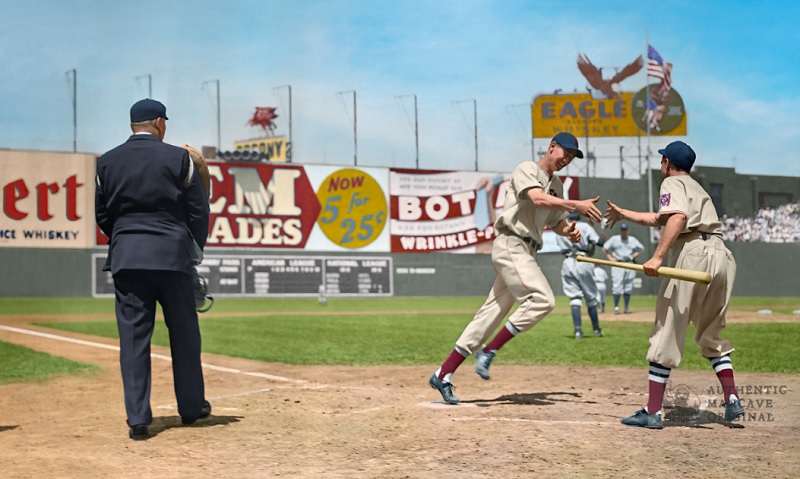
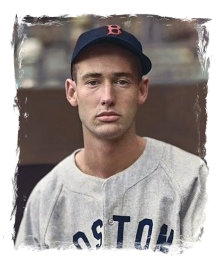


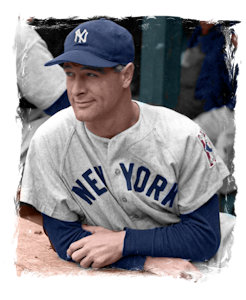
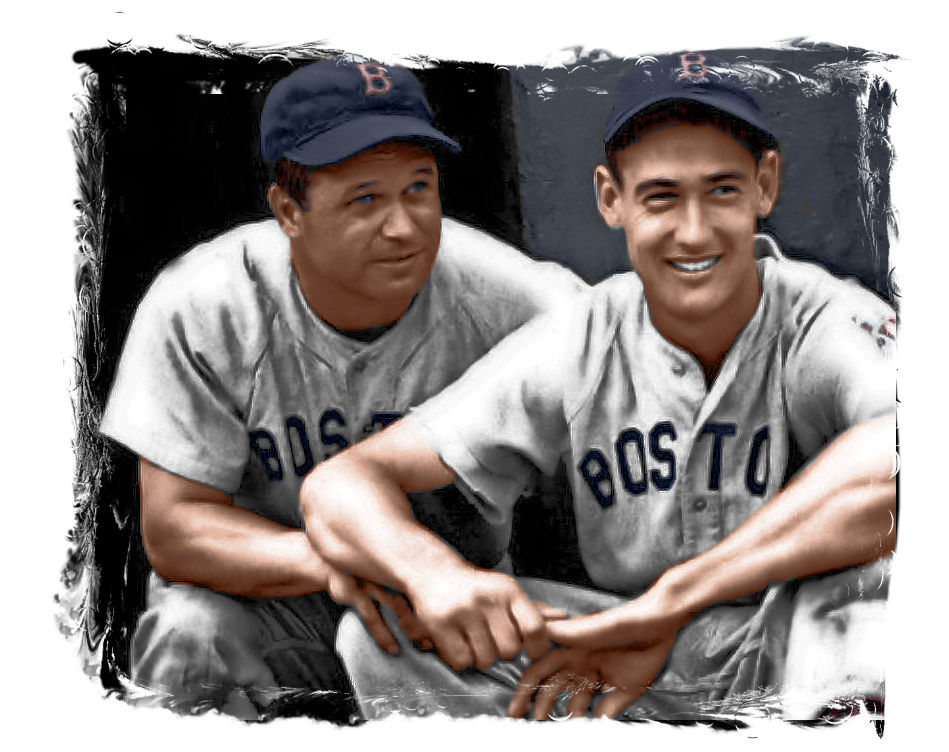



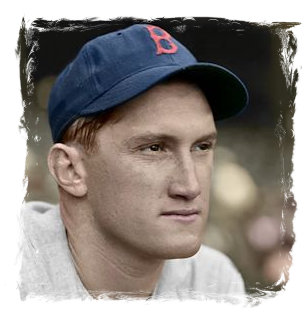
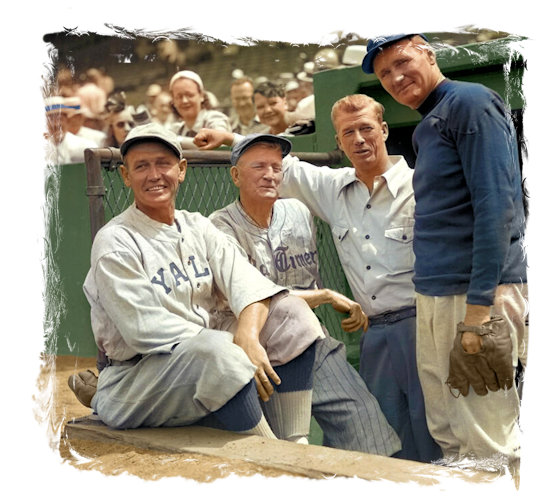
.jpg)

